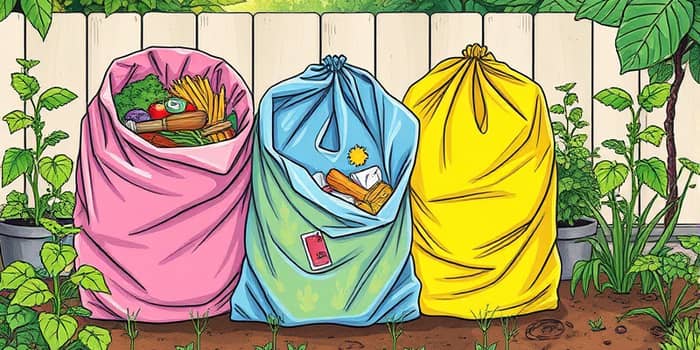In an era where sustainable choices matter more than ever, selecting a trash bag that blends eco-friendly benefits with daily performance is crucial. From busy households to commercial kitchens, the right biodegradable or compostable bag can reduce plastic waste while offering the strength needed to handle everything from wet scraps to yard debris.
Understanding Biodegradable Versus Compostable Bags
Biodegradable bags rely on natural microorganisms to break down polymer chains over time. While they degrade faster than conventional plastics, some may leave behind microplastics or synthetic residues if conditions are suboptimal.
Compostable trash bags, in contrast, are engineered from plant starches like cornstarch or sugarcane. These materials decompose fully under proper composting conditions and do not release toxins, making them a leading choice for conscientious consumers.
Materials and Composition
Leading biodegradable and compostable bags often use a blend of PBAT (Polybutylene Adipate Terephthalate) and PLA (Polylactic Acid) derived from plants. Innovative manufacturers combine these bioplastics with non-toxic plant fibers to bolster strength without relying on petroleum.
Such innovative blends of bioplastics deliver improved puncture resistance and elasticity, ensuring that even heavy or wet waste containers remain intact until disposal.
Decomposition and Environmental Impact
Under ideal conditions—adequate moisture, air, and warmth—biodegradable bags can break down within 3 to 6 months. However, landfills lack the oxygen and microbial activity to support rapid decomposition, so actual breakdown times may be significantly longer.
Certified compostable bags, especially those approved for home composting, can degrade in backyard bins within a few months. Industrial facilities, governed by ASTM D6400 standards, guarantee disintegration and biodegradation within 180 days.
Certifications to Look For
- BPI Certified: Meets rigorous compostability criteria without leaving synthetic residues in industrial settings.
- TUV HOME OK: Proven to compost safely in backyard bins, ensuring consumer-friendly home composting.
- ASTM D6400: Internationally recognized standard guaranteeing decomposition in commercial composting facilities.
Performance in Everyday Use
Strength and durability are paramount. The best brands advertise tear-resistant and leak-proof construction, allowing users to handle wet kitchen waste or heavy yard debris with confidence.
To optimize bag life:
- Drain excess liquids before bagging.
- Empty bags every 2–3 days to prevent premature breakdown.
- Store in a cool, dry place to maintain resilience.
Notable Brands and Comparisons
Below is a comparison of top-rated biodegradable and compostable trash bag brands, highlighting their key features and certifications to help you make an informed choice.
Pros and Cons
- Pros:
- Made from renewable plant-based resources
- Certified bags ensure clean decomposition
- Free from BPA, PFOA, and toxins
- Reduce plastic pollution when disposed properly
Cons:
Some biodegradable options may begin to degrade if exposed to moisture for extended periods, so timely disposal is critical. In landfills, lack of oxygen slows decomposition, prolonging their environmental footprint. Additionally, these bags cannot be recycled and may not fully decompose if made primarily from certain polymers.
Price, Value, and Consumer Feedback
Entry-level compostable bags start around $20 per box, with premium lines offering subscription savings up to 25%. While the upfront cost exceeds that of traditional plastic, the long-term eco-benefits justify the investment, especially for households prioritizing sustainability.
Consumer Reports and online reviews consistently rate BPI- and TUV-certified bags above 4.7 stars. Users praise their consistent high durability ratings and leak prevention, noting that certified options outperform generic biodegradable brands.
Final Takeaways
When selecting trash bags that truly hold up, prioritize certified compostable options from reputable brands. Look for BPI, TUV HOME OK, or ASTM D6400 logos to ensure your bags break down cleanly without harmful residues.
Adopt best practices—drain liquids, store bags properly, and dispose of them through composting channels if available—to maximize performance and environmental impact. By choosing quality biodegradable or compostable trash bags, you can uphold both your household’s practical needs and your commitment to a greener planet.
References
- https://veggiesabroad.com/compostable-trash-kitchen-bags/
- https://theroundup.org/eco-friendly-trash-bags/
- https://www.greenhive.io/blog/best-biodegradable-trash-bags-brands
- https://holdonbags.com/products/compostable-tall-kitchen-bag
- https://www.youtube.com/watch?v=7aO8g5RnZRU
- https://greencitizen.com/blog/biodegradable-trash-bags/
- https://totebagfactory.com/blogs/news/top-5-biodegradable-garbage-bags-for-eco-friendly-waste-management
- https://greenpaperproducts.com/collections/compostable-bags/compostable-trash-bags










